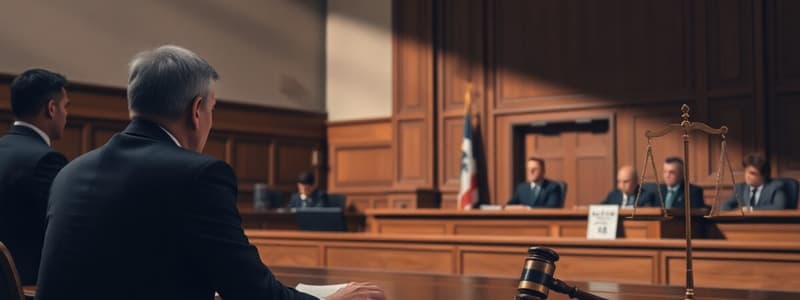Podcast
Questions and Answers
The release of an accused person from custody, for all or part of the time before or during prosecution on his or her promise to appear in court when required.
The release of an accused person from custody, for all or part of the time before or during prosecution on his or her promise to appear in court when required.
Pretrial release
An appearance before a magistrate during which the legality of the defendant's arrest is initially assessed and the defendant is informed of the charges of which he or she is being held.
An appearance before a magistrate during which the legality of the defendant's arrest is initially assessed and the defendant is informed of the charges of which he or she is being held.
First appearance
A document guaranteeing the appearance of a defendant in court as required and recording the pledge of money or property to be paid to the court if he or she does not appear, which is signed by the person to be released and anyone else acting on his or her behalf.
A document guaranteeing the appearance of a defendant in court as required and recording the pledge of money or property to be paid to the court if he or she does not appear, which is signed by the person to be released and anyone else acting on his or her behalf.
Bail bond
The setting of bail in the form of land, houses, stocks, or other tangible property.
The setting of bail in the form of land, houses, stocks, or other tangible property.
A law intended to prevent the pretrial release of a criminal defendant judged to represent a danger to others in the community.
A law intended to prevent the pretrial release of a criminal defendant judged to represent a danger to others in the community.
The process of negotiating an agreement among the defendants, the prosecutor, and the court as to an appropriate plea and associated sentence in a given case.
The process of negotiating an agreement among the defendants, the prosecutor, and the court as to an appropriate plea and associated sentence in a given case.
In criminal proceedings, the defendant's formal answer in court to the charge contained in any complaint, information, or indictment that he or she is guilty of the offense charged, is not guilty of the offense charged, or does not contest the charge.
In criminal proceedings, the defendant's formal answer in court to the charge contained in any complaint, information, or indictment that he or she is guilty of the offense charged, is not guilty of the offense charged, or does not contest the charge.
Court rules that govern the admissibility of evidence at a criminal hearing and trials.
Court rules that govern the admissibility of evidence at a criminal hearing and trials.
Federal law requiring that proceedings against a defendant in a federal criminal case begin within a specified period of time, such as 70 working days after indictment.
Federal law requiring that proceedings against a defendant in a federal criminal case begin within a specified period of time, such as 70 working days after indictment.
A jury that is isolated from the public during the course of a trial and throughout the deliberation process.
A jury that is isolated from the public during the course of a trial and throughout the deliberation process.
The process whereby, according to law and precedent, members of a jury are chosen.
The process whereby, according to law and precedent, members of a jury are chosen.
Oral evidence offered by a sworn witness on the witness stand during a criminal trial.
Oral evidence offered by a sworn witness on the witness stand during a criminal trial.
Anything useful to a judge or jury in deciding the facts of a case.
Anything useful to a judge or jury in deciding the facts of a case.
Evidence that consists of physical material or traces of physical activity.
Evidence that consists of physical material or traces of physical activity.
Evidence, if believed, directly proves a fact.
Evidence, if believed, directly proves a fact.
Flashcards
Pre-Trial Release
Pre-Trial Release
The release of an accused person from custody, for all or part of the time before or during prosecution on his or her promise to appear in court when required.
Initial Appearance
Initial Appearance
An appearance before a magistrate during which the legality of the defendant's arrest is initially assessed and the defendant is informed of the charges of which he or she is being held.
Bail Bond
Bail Bond
A document guaranteeing the appearance of a defendant in court as required and recording the pledge of money or property to be paid to the court if he or she does not appear, which is signed by the person to be released and anyone else acting on his or her behalf.
Real Property Bail
Real Property Bail
Signup and view all the flashcards
Danger to the Community
Danger to the Community
Signup and view all the flashcards
Plea Bargaining
Plea Bargaining
Signup and view all the flashcards
Plea
Plea
Signup and view all the flashcards
Rules of Evidence
Rules of Evidence
Signup and view all the flashcards
Speedy Trial Act
Speedy Trial Act
Signup and view all the flashcards
Sequestered Jury
Sequestered Jury
Signup and view all the flashcards
Jury Selection
Jury Selection
Signup and view all the flashcards
Testimony
Testimony
Signup and view all the flashcards
Evidence
Evidence
Signup and view all the flashcards
Physical Evidence
Physical Evidence
Signup and view all the flashcards
Direct Evidence
Direct Evidence
Signup and view all the flashcards
Study Notes
Pretrial Activities and the Criminal Trial
- Release of Accused: Release from custody, for all or part of the time, pending prosecution, based on a promise to appear in court.
- Initial Appearance: Appearance before a magistrate to assess the legality of the arrest and inform the defendant of charges.
- Bail and Guarantees: A document ensuring the defendant's court appearance, often involving a pledge of money or property. Can involve land, houses, stocks, or other tangible assets to prevent pretrial release.
- Danger to Others: A law intended to prevent a criminal defendant from being released if deemed a danger to the community.
- Negotiating an Agreement: A process where defendants, prosecutors, and the court reach an agreement on a plea and sentence.
- Formal Answer: Defendant's statement (guilty, not guilty, or no contest) in response to charges.
- Admissibility of Evidence: Court rules governing the acceptance of evidence in criminal hearings and trials.
- Time Limits: Federal law requiring legal proceedings against a defendant to begin within a specified period (e.g., 70 working days after indictment).
- Sequestered Jury: A jury isolated from public contact during trial and deliberation.
- Jury Selection Process: The process of choosing jurors (according to law and precedent) for a criminal trial.
- Oral Testimony: Sworn witness testimony given during a trial.
Evidence in a Trial
- Helpful Evidence: Any information useful to a judge or jury in determining the facts.
- Physical Evidence: Physical material or traces of activity, providing key evidence.
- Direct Evidence: Evidence that directly proves a fact (based on observations, not inference).
Studying That Suits You
Use AI to generate personalized quizzes and flashcards to suit your learning preferences.



